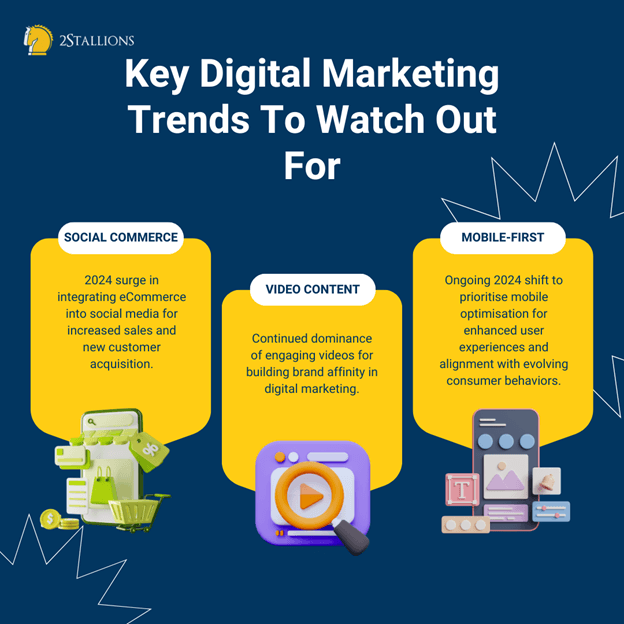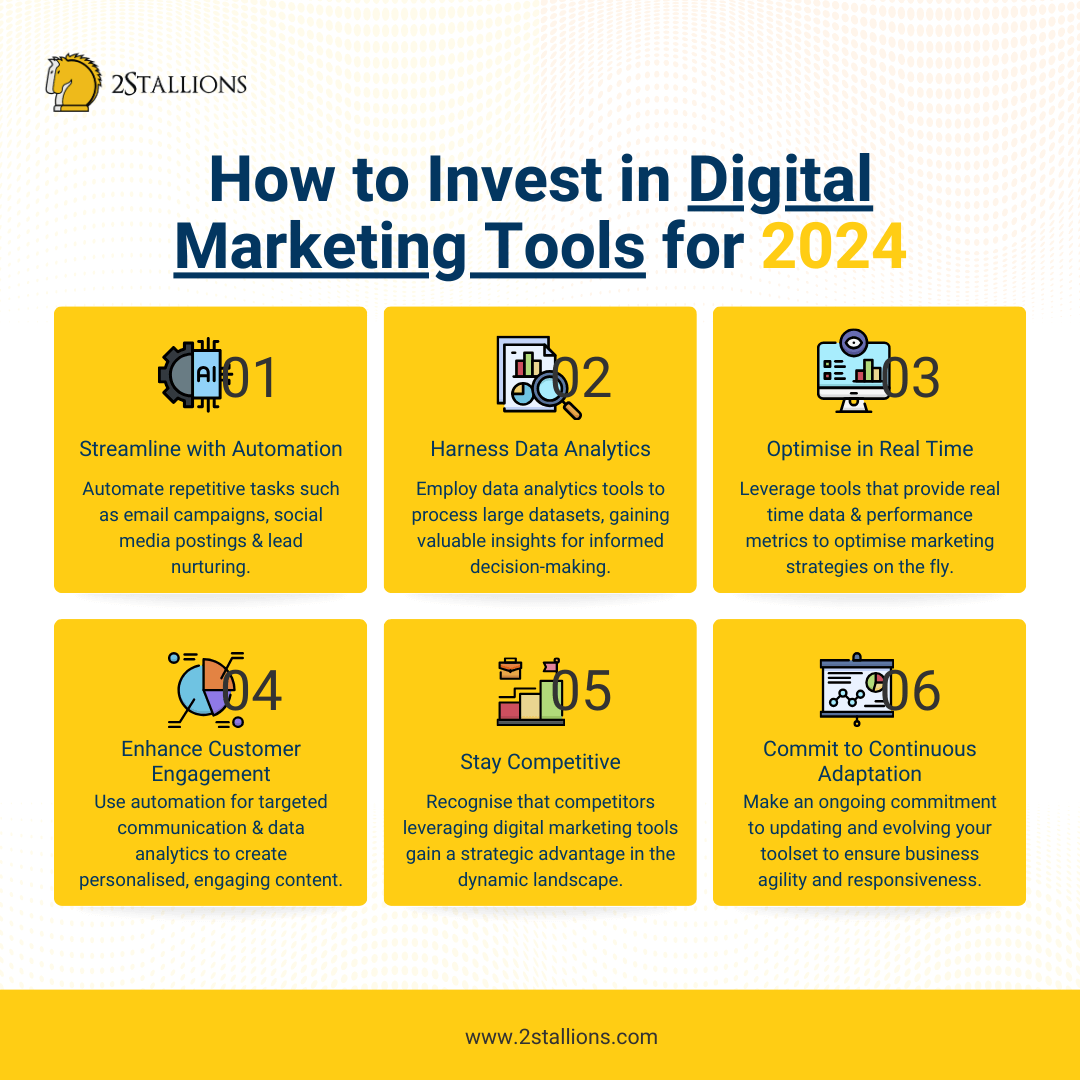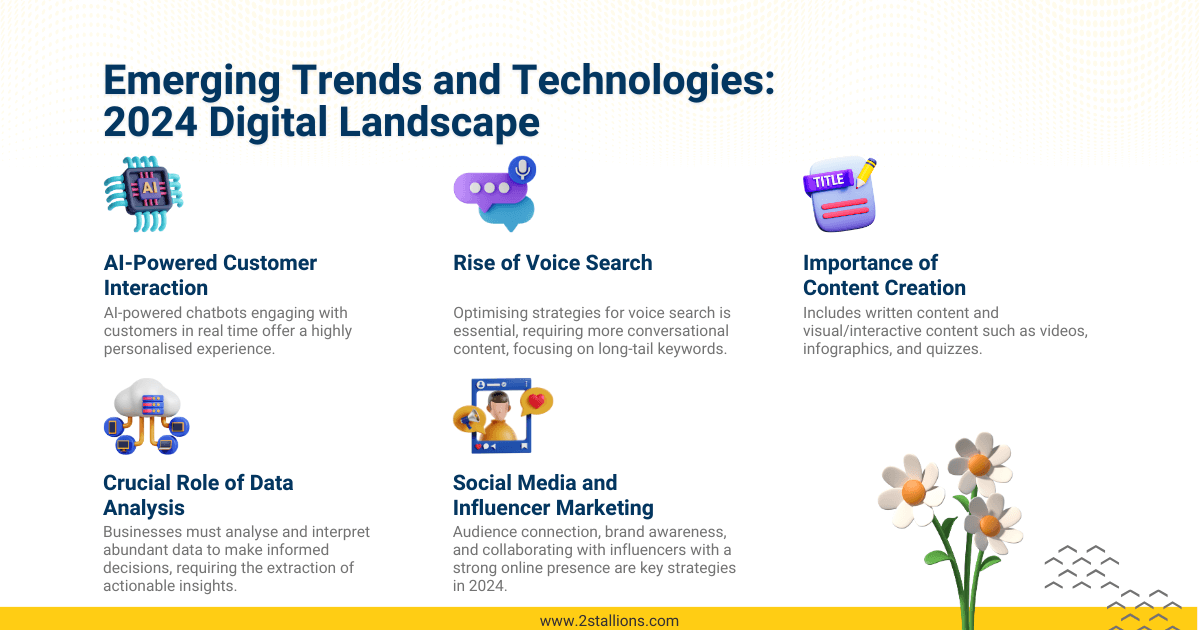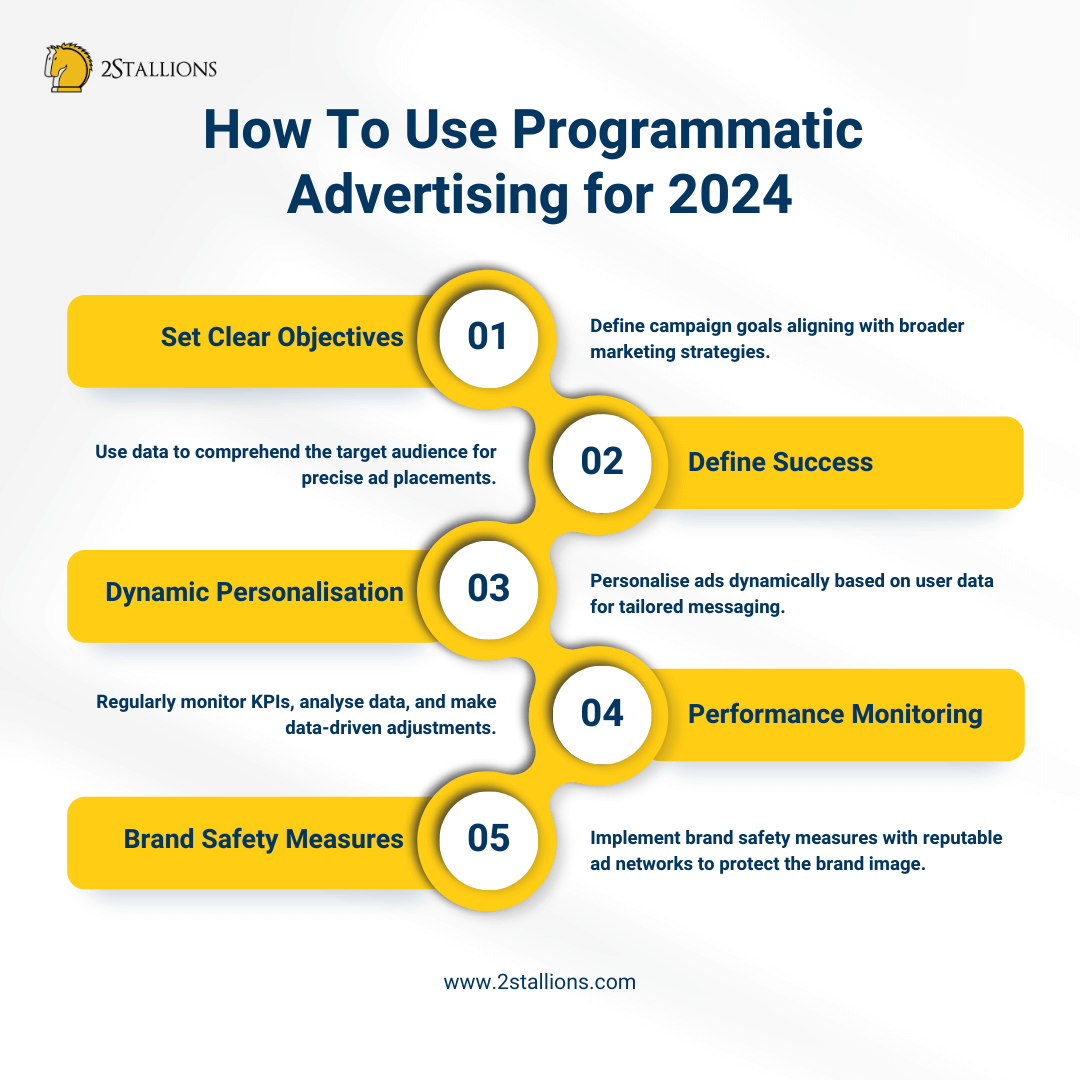SHARE

In today’s fast-paced digital world, the marketing landscape is constantly evolving. To stay ahead of the game, businesses must keep up with current trends and anticipate the future. As we venture into the year 2025, let’s explore some of the exciting digital marketing trends that are set to shape the industry.
Understanding The Digital Marketing Landscape In 2025
AI Tools in Digital Marketing
Technological advancements and evolving consumer behaviours will shape the digital marketing landscape in 2025. Integrating artificial intelligence (AI) into marketing strategies is a dominant trend. AI-powered tools, from advanced chatbots to predictive analytics, will redefine how businesses connect with their audience. Picture AI-driven chatbots offering human-like responses to customer queries, providing instant support, and delivering personalised recommendations based on individual preferences and purchase history.
[thrive_leads id=’8271′]
This high level of personalisation ensures a seamless customer experience, fostering satisfaction and loyalty. Moreover, AI-driven predictive analytics will empower businesses to make real-time, data-driven decisions. By analysing extensive customer data, AI algorithms identify patterns and trends, allowing marketers to precisely target audiences with tailored messages. This precision promises higher conversion rates and a substantial return on investment.
Voice Search and SEO
Another significant trend in 2025 will be the rise of voice search and its impact on search engine optimisation (SEO). With the growing popularity of voice assistants such as Siri and Alexa, businesses must adapt their SEO strategies to cater to voice-based queries. This means focusing on long-tail keywords and natural language processing to ensure their content is voice search-friendly.
Voice search is changing the way people interact with search engines. Instead of typing a query into a search bar, users can simply ask a question out loud, and their voice assistant will provide the most relevant answer. This shift in search behaviour requires businesses to optimise their content for voice search. By incorporating conversational language and answering common questions, businesses can increase their chances of appearing in voice search results and capturing the attention of voice assistant users.
Personalised Marketing
Personalised marketing will also be crucial in 2025. As consumers become more discerning, businesses must tailor their marketing messages to meet individual preferences and needs. Personalisation will enhance customer experiences and drive customer loyalty and conversions.
Individualised Experiences
Businesses must move beyond generic mass marketing and focus on creating individualised customer experiences. This can be achieved by leveraging customer data to understand their preferences, purchase histories, and browsing behaviour.
Targeted Marketing Messages
Businesses can use this information to deliver targeted marketing messages that resonate with each customer personally. Whether through personalised email campaigns, customised product recommendations, or tailored social media ads, businesses can create a sense of exclusivity and relevance, making customers feel valued and understood.
Offline Personalisation
Moreover, personalised marketing can also extend to offline experiences. Imagine entering a store where the sales assistant knows your preferences and previous purchases. They can provide personalised recommendations and offers, creating a seamless and personalised shopping experience. This level of personalisation will drive customer loyalty and increase the likelihood of repeat purchases and positive word-of-mouth recommendations.
Technological Advancements
Technological advancements and changing consumer behaviours will shape the digital marketing landscape in 2025. Artificial intelligence will revolutionise how businesses reach and engage with their target audience, while voice search will require businesses to adapt their SEO strategies.
Embracing Trends
Personalised marketing will be crucial in enhancing customer experiences and driving customer loyalty. As the digital marketing landscape continues to evolve, businesses must stay ahead of the curve and embrace these trends to remain competitive.
Key Digital Marketing Trends to Watch Out For
Staying abreast of emerging trends is crucial for businesses aiming to remain competitive and effectively connect with their target audience. As we look forward to 2025, several trends are poised to shape the digital marketing realm.
1. Social Commerce Integration
Social commerce is anticipated to gain significant traction in 2025, redefining how consumers interact with products and services. Social media platforms will further integrate eCommerce functionalities, enabling users to make seamless purchases directly within their favourite social apps. This evolution is not merely a convenience for consumers; it represents a powerful opportunity for businesses to tap into new customer bases and enhance overall sales. Recognising the potential of social commerce and strategically leveraging it will be essential for businesses seeking to stay ahead in the digital marketplace.
2. Video Content Dominance
The dominance of video content is poised to continue shaping the future of digital marketing. Videos have emerged as the preferred medium for consuming content across various platforms. Businesses can capitalise on this trend by creating compelling and shareable video content. Whether it’s informative product demonstrations, engaging storytelling, or behind-the-scenes glimpses into the company culture, videos provide a dynamic means for businesses to connect with their audience on a deeper, more personal level. Incorporating video content into marketing strategies will foster engagement and build brand affinity.
3. Mobile-First Marketing
The relentless shift towards mobile-first marketing is set to maintain its momentum in 2025. With many consumers accessing the internet through mobile devices, businesses must prioritise mobile optimisation across all facets of their digital presence. This entails ensuring a responsive website design that adapts seamlessly to various screen sizes, crafting mobile-friendly email campaigns, and, where applicable, investing in mobile app development.
By embracing a mobile-first approach, businesses can enhance user experiences and effectively engage with their target audience in a manner aligned with evolving consumer behaviours. As digital marketing continues to evolve, businesses that strategically navigate these trends will position themselves for success in the competitive and dynamic digital landscape of 2025.
Preparing Your Business for Digital Marketing in 2025
Adapting your marketing strategy for the future is crucial to staying ahead of the competition. In 2025, businesses must be agile and willing to embrace change. This means regularly evaluating marketing strategies, monitoring industry trends, and making necessary adjustments.
Investing in Digital Marketing Tools
In addition, investing in the right digital marketing tools is essential for success. From marketing automation platforms like Hubspot to data analytics tools, businesses must equip themselves with the latest technologies to streamline their marketing efforts and provide valuable insights. Building a team with the right digital marketing skills is also paramount. In 2025, digital marketing will require diverse skills, including AI, SEO, content creation, and data analysis expertise. Businesses must invest in hiring and training professionals who can navigate the ever-changing digital landscape.
Emerging Trends
As we look ahead to the digital marketing landscape in 2025, it is crucial to consider the emerging trends and technologies that will shape the industry:
Challenges and Opportunities in Data Privacy
While the future of digital marketing is undoubtedly exciting, it has its challenges. Navigating data privacy concerns will be a top priority for businesses in 2025. With stricter regulations and increased consumer awareness, businesses must prioritise data security and transparency in their marketing practices.
GDPR Compliance
One of the significant challenges businesses will face in data privacy is the General Data Protection Regulation (GDPR). This regulation, implemented in 2018, requires businesses to obtain explicit consent from individuals before collecting and using their data. It also grants individuals the right to access and control their personal information. Adhering to these regulations will require businesses to invest in robust data protection measures and establish clear consent mechanisms.
Programmatic Advertising Opportunities
However, with challenges come opportunities. Programmatic advertising, for instance, presents an excellent opportunity for businesses to reach their target audience with highly relevant and personalised advertisements. Businesses can optimise their ad placements and budgets by leveraging programmatic advertising platforms for maximum impact.
How Programmatic Advertising Works
Programmatic advertising relies on algorithms and real-time bidding to automate the buying and selling of ad inventory. This allows businesses to target specific demographics, interests, and behaviours, ensuring that their ads are seen by the right people at the right time. Programmatic advertising can significantly enhance the effectiveness of digital marketing campaigns by delivering personalised messages at scale.
Addressing Ad-Blocking Challenges
Additionally, overcoming the challenges posed by ad-blocking technology will be crucial in 2025. As more internet users install ad-blockers, businesses must find innovative ways to engage with their audience. This could involve exploring native advertising, influencer marketing, or other alternative advertising methods less likely to be blocked.
Native Advertising and Influencer Marketing
– Native Advertising: Seamlessly integrating branded content into the user’s online experience makes it less intrusive and more engaging. Sponsored articles, videos, or social media posts provide valuable information or entertainment.
– Influencer Marketing: Leveraging the popularity and credibility of social media influencers to promote products or services allows businesses to reach a highly targeted and receptive audience.
Technology and the Future of Digital Marketing
The future of digital marketing is full of possibilities and challenges. As technology advances rapidly, the digital marketing landscape is constantly evolving.
The Role of Artificial Intelligence (AI)
In 2025, businesses must stay ahead by staying informed about the latest trends and technologies. Artificial intelligence (AI), for example, is expected to shape the future of digital marketing significantly.
AI-Powered Marketing Tools
AI-powered tools and algorithms can analyse vast amounts of data to identify patterns, predict consumer behaviour, and automate marketing processes. This can help businesses deliver more personalised and targeted marketing campaigns, improving customer engagement and conversion rates. The possibilities for AI in digital marketing are vast, from chatbots that provide instant customer support to AI-powered content creation tools.
Voice Search and Smart Devices
Furthermore, the rise of voice search and smart devices will present new opportunities and challenges for digital marketers. As more people use voice assistants like Siri, Alexa, and Google Assistant, businesses must optimise their online content for voice search queries. This will require a shift in keyword strategy and a focus on conversational and long-tail keywords.
Leveraging Smart Devices for Marketing
Moreover, the increasing popularity of smart devices like smart speakers, smart TVs, and wearable technology opens up new channels for reaching consumers. Businesses can leverage these devices to deliver targeted advertisements, personalised recommendations, and interactive experiences. However, they must also ensure their marketing efforts are seamlessly integrated across multiple devices and platforms.
Navigating the Future
The future of digital marketing holds both challenges and opportunities. By staying informed, embracing new technologies, and adopting innovative strategies, businesses can navigate the evolving landscape and thrive in the digital era of 2025 and beyond. So, gear up, adapt, and get ready to conquer the digital marketing landscape of tomorrow!
Conclusion: Embracing the Digital Horizon
In the fast-evolving digital marketing sphere, 2025 is set to witness transformative trends driven by advancements in AI, the growth of voice search, and the drive towards personalisation. While the landscape is dotted with promising opportunities, businesses must also tread with vigilance, especially in data privacy and ad-blocking technologies.
Crucially, success in this realm will hinge on the agility to adapt, the foresight to anticipate changes, and the commitment to offer genuine, individualised experiences. As the digital wave continues its relentless surge, businesses must equip themselves to ride it and harness its full potential, ensuring they remain at the vanguard of innovation, engagement, and growth. The digital odyssey of 2025 awaits, and businesses must now chart their course with informed precision and strategic flair.
Frequently Asked Questions About the Future of Digital Marketing Trends in 2025
How metaverse will impact digital marketing?
The metaverse, a collective virtual shared space, is expected to influence digital marketing trends in 2025 significantly. Marketers may explore new ways to engage audiences within immersive virtual environments, creating opportunities for innovative and interactive brand experiences. Understanding the metaverse and its implications for digital marketing will be crucial for staying ahead in this evolving landscape.
Why is voice recognition important?
With the increasing prevalence of voice-activated devices and smart speakers, digital marketers will need to optimise their strategies for voice search. Tailoring content to conversational queries and understanding the nuances of voice-based interactions will be essential for maintaining visibility in search results. Adapting to the rise of voice technology will be a key consideration for marketers in 2025.
How does privacy relate to marketing?
As concerns about data privacy continue to grow, digital marketers will face evolving regulations that may impact data collection, tracking, and targeted advertising. Adhering to privacy regulations while still delivering personalised and relevant content will be a challenge. Staying informed about changing privacy laws and implementing compliant practices will be essential for successful digital marketing strategies.
Will marketing be in demand in the future?
Social media platforms are likely to evolve, and user behaviour will continue to change in 2025. Marketers will need to stay abreast of emerging trends on platforms like TikTok, Instagram, and others, adapting their strategies to align with shifting user preferences. Understanding the dynamics of social media and effectively leveraging these platforms for marketing purposes will be crucial for brands aiming to connect with their target audiences.















